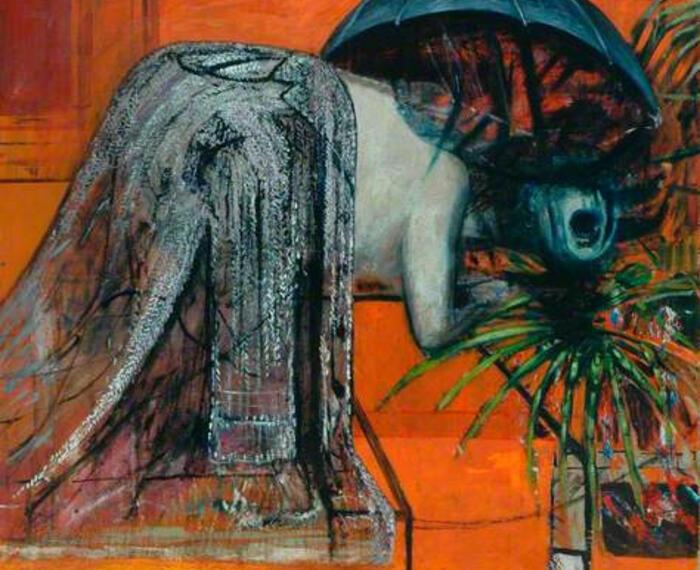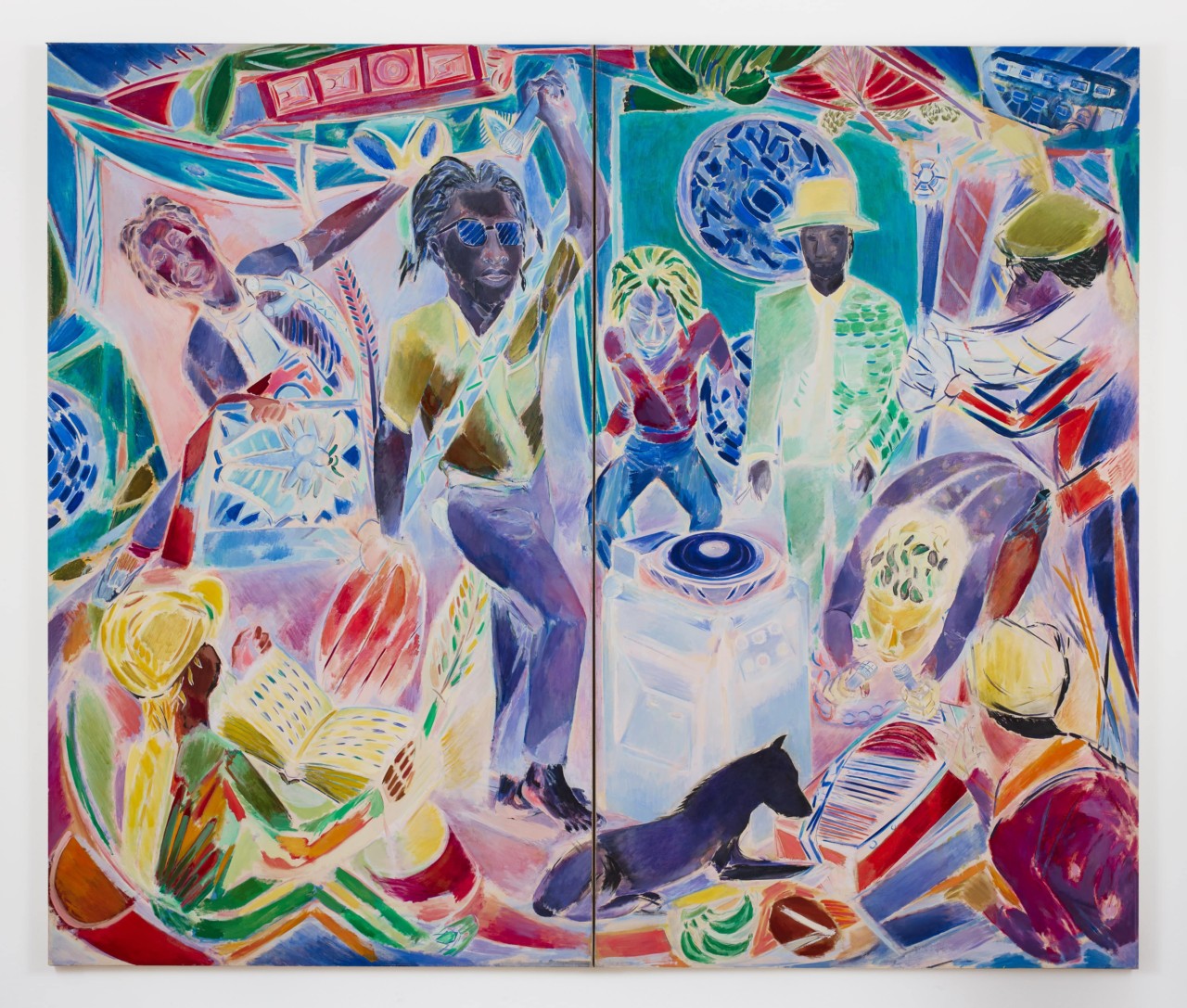


Denzil Forrester, ‘Wolf Singer’, 1984. Oil on canvas. Copyright Denzil Forrester. Courtesy the artist and Stephen Friedman Gallery, London.
Denzil Forrester’s (b. 1956) vibrant paintings, currently on view in a retrospective at Stephen Friedman Gallery, vividly bring back to life the dynamic energy of East London’s Reggae and Dub night club scene in the late 1970s and early 80s. A Survey, Forrester’s first exhibition with the gallery, features drawings and paintings from the past four decades.
The dancehall has been an enduring subject in his work. Early paintings such as The Cave (1978) pulsate with rhythm. Flashes of bright colours, gestural brushstrokes and frenetic compositions capture crowds dancing with joy to the beat of the music.
Forrester’s expressive brushstrokes together with his exaggerated perspectives suggest parallels with Wassily Kandinsky and Franz Marc, founding members of Der Blaue Reiter. At the same time, the realness and vitality with which he depicts the world around him, draws reference from artists such as Max Beckmann or Stanley Spencer.
It is a revelation to witness so many large-scale canvases as well as drawings by a long-overlooked artist, who had to fight for his place within an art world that was seen mostly as white and western until recently.
Forrester’s expressive depictions of nightclubs and dancefloors are based on sketches of clubbers he drew in situ before developing them into larger paintings in his studio. Mostly produced during the 80s, these drawings continue to form the basis of his oeuvre today.
Night Shift (2019) presents a visual recollection of East London’s Blues and Dub clubs that now have mostly disappeared due to gentrification. The threatening presence of two uniformed policemen in the background of the painting forms a stark contrast to the four figures in the foreground that sway with their backs to the viewer. Unlike Forrester’s earlier depictions of night life, which seem to radiate harmony and unity, Night Shift is notable for the clear divide between the night club goers and the policemen.
It quickly becomes evident that away from depicting dance hall scenes, Forrester’s works are also an important documentation of Black British culture in London during the 1980s. Night Shift relates to the rising tension between the police and members of the young Black community in the Thatcher years, which eventually culminated in the Brixton Riots. The painting Blue Jay (1987) is inspired by the brutal death of his family friend Winston Rose, who died in a police van in 1981 after having been forcibly detained by 11 policemen.
Reading with Ma Pets (2018) allows us a glimpse into an intimate scene from the artist’s childhood memories: We can see Forrester as a young boy reading a book with his teacher in his native Grenada. The small red suitcase next to the teacher’s chair might suggest the boy’s approaching move to England, where he joined his mother in Stoke Newington in 1967. Family Living (2004) also recalls an earlier period. The domestic scene refers to the times when, shortly after he arrived from Grenada, he helped his mother late into the night sewing bags in the basement of their home for a living. Singer sewing machines and tumble dryers appear in the work, painted in an expressive style similar to his night club paintings.
A highlight of the show is Wolf Singer (1984), a monumental diptych that was made by Forrester during a fellowship at the British School at Rome from 1983 to 1985. It is presented in a separate space adjacent to the main gallery and is one of the largest works the artist has ever made, measuring 3.38 x 4 metres.
In this work, Forrester’s West Indian roots, the music scene in London and his new-found experiences of being in Rome come together. The work captures the energy of the music played at Notting Hill Carnival and we can see sound systems, dancing bodies and a London bus in the top right. The colours are much brighter than in other works made during the 1980s, influenced by the intense light that the artist experienced whilst he was living in Italy.
Forrester moved to Truro, Cornwall in 2016. In this coastal county he has produced imagined scenes such as From Trench Town to Porthtowan (2017), which depicts a Rastafarian man in handcuffs being arrested by two police men whilst other people are at leisure on the beach. Dissatisfied with merely capturing beach scenes in his new surroundings, despite the nostalgia they stirred in him for his childhood in the West Indies, Forrester explains: "I started painting Porthtowan beach and I said: 'I’m going to draw black people on the beach.' But it was too calm, it needed a punch, so I used one of my older paintings ‘Three Wicked Men’ [...] to give it a kick up the arse. It was like superimposing something from London on to a beach in Cornwall."
Forrester’s oeuvre, shaped by his own biographical lens, allows us to look back at a pivotal decade for British subculture and politics from a historical distance, but at the same time his paintings trigger us to realise with discomfort that many of the issues at stake in the 1980s have lost none of their relevance today. The fascinating exhibition is an overdue and highly deserved critical assessment of a great artist of the Windrush Generation, who has been championed by fellow artist Peter Doig as ‘one of the most important painters to come out of London in the early 80s and his work remains as vital and relevant today as it was then’.
Christine Takengny
Curator
A substantial new publication featuring a foreword by Peter Doig will be launched at Stephen Friedman Gallery on 23 May 2019, 6.30-7.30pm.
Stephen Friedman Gallery, 25-28 Old Burlington Street, London W1S 3AN. Open Tuesday-Friday 10.00-18.00, Saturday 11.00-17.00. Exhibition continues until 25 May 2019. www.stephenfriedman.com